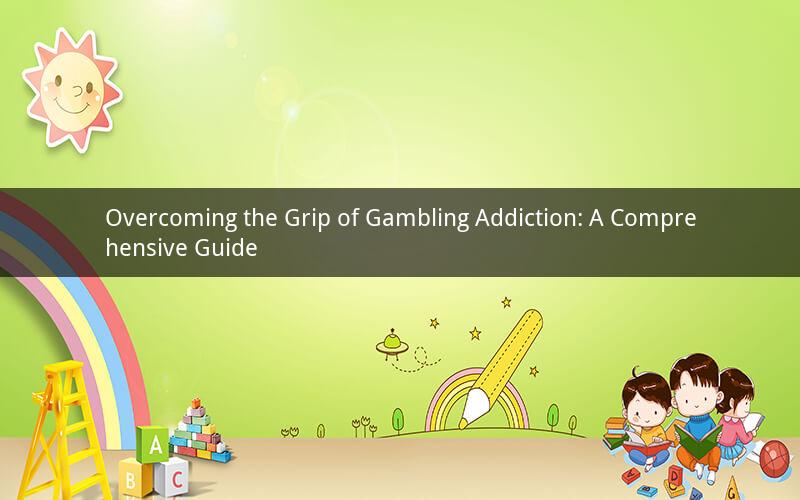
Introduction:
Gambling addiction is a complex issue that affects millions of people worldwide. It is characterized by an inability to control the urge to gamble, leading to severe consequences in various aspects of life. This guide aims to provide an in-depth understanding of gambling addiction, its causes, symptoms, and effective strategies to break free from its grip.
1. Understanding Gambling Addiction:
Gambling addiction, also known as problem gambling or compulsive gambling, is a mental health disorder. It is characterized by a persistent and uncontrollable urge to gamble, despite negative consequences. Here are some key points to understand gambling addiction:
a. Definition: Gambling addiction is a chronic and progressive disorder that affects the individual's ability to control their gambling behavior.
b. Causes: Several factors contribute to the development of gambling addiction, including genetic predisposition, environmental influences, and personal vulnerabilities.
c. Symptoms: Common symptoms of gambling addiction include preoccupation with gambling, loss of control over gambling behavior, increased risk of financial, social, and psychological consequences, and a strong urge to gamble despite negative outcomes.
2. Recognizing the Signs:
Identifying the signs of gambling addiction is crucial in seeking help and overcoming the problem. Here are some common signs to look out for:
a. Financial difficulties: Experiencing financial problems due to excessive gambling, such as unpaid bills, debts, or borrowing money.
b. Time and energy dedication: Spending a significant amount of time and energy on gambling activities, neglecting other responsibilities and relationships.
c. Emotional and psychological distress: Experiencing negative emotions such as anxiety, depression, or irritability when unable to gamble.
d. Lying and secrecy: Hiding gambling activities from family, friends, or employers, and lying about the extent of gambling involvement.
3. Seeking Professional Help:
Overcoming a gambling addiction is challenging, and seeking professional help is crucial. Here are some steps to consider:
a. Consult a therapist: A therapist specializing in gambling addiction can provide personalized treatment plans and support throughout the recovery process.
b. Join a support group: Support groups such as Gamblers Anonymous can offer a sense of community and understanding from individuals who have experienced similar struggles.
c. Consider medication: In some cases, medication may be prescribed to help manage underlying mental health issues contributing to the addiction.
4. Strategies for Breaking the Habit:
Breaking the habit of gambling addiction requires determination and effective strategies. Here are some helpful approaches:
a. Set clear boundaries: Establish strict limits on gambling activities, including time, money, and locations.
b. Identify triggers: Identify situations or emotions that trigger the urge to gamble and develop coping mechanisms to avoid these triggers.
c. Develop healthy habits: Engage in activities that provide fulfillment and distraction from gambling, such as exercise, hobbies, or socializing.
d. Create a support network: Surround yourself with individuals who support your recovery journey and hold you accountable.
5. Long-term Recovery and Maintenance:
Overcoming a gambling addiction is a lifelong process that requires continuous effort and maintenance. Here are some tips for long-term recovery:
a. Stay committed: Maintain a strong commitment to recovery and remind yourself of the reasons why you want to overcome the addiction.
b. Monitor progress: Regularly assess your progress and adjust your strategies as needed.
c. Practice self-care: Prioritize self-care activities to maintain physical, emotional, and mental well-being.
d. Avoid relapse triggers: Stay vigilant about potential triggers and develop strategies to prevent relapse.
Frequently Asked Questions:
1. What is the most effective treatment for gambling addiction?
Answer: The most effective treatment for gambling addiction depends on the individual's specific needs. A combination of therapy, support groups, and medication may be beneficial.
2. Can gambling addiction be cured?
Answer: While gambling addiction is a chronic condition, it can be managed and overcome with proper treatment and support.
3. How long does it take to overcome a gambling addiction?
Answer: The duration of recovery varies for each individual. Some may experience significant improvement within a few months, while others may require ongoing treatment and support for years.
4. Can family therapy help in overcoming gambling addiction?
Answer: Yes, family therapy can be highly beneficial in addressing the impact of gambling addiction on family dynamics and supporting the individual's recovery journey.
5. Is it possible to gamble responsibly?
Answer: While it is possible to gamble responsibly for some individuals, it is crucial to be aware of personal vulnerabilities and set clear boundaries to prevent the development of a gambling addiction.